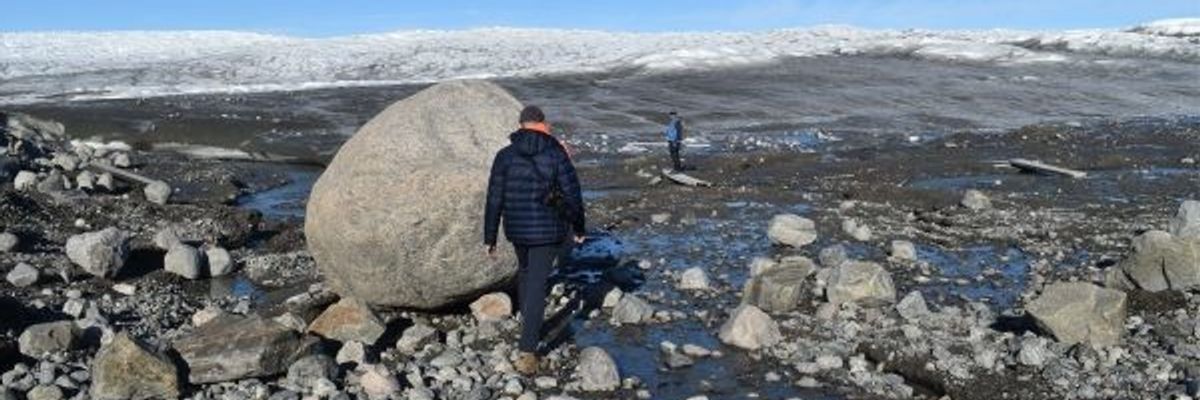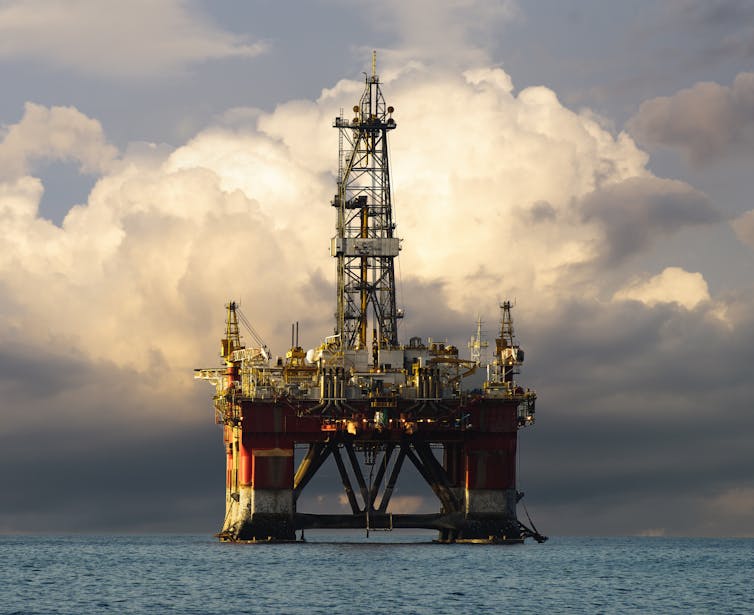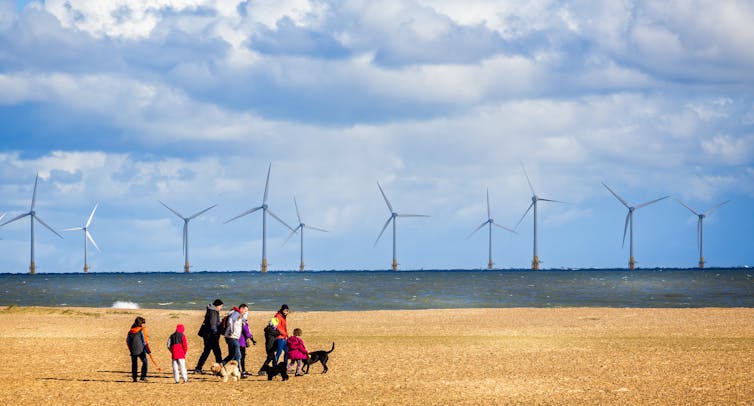‘Call to Action’: CO2 Now at Levels Not Seen in 14 Million Years
Original article by OLIVIA ROSANE republished from Common Dreams under Creative Commons (CC BY-NC-ND 3.0).

“It really brings it home to us that what we are doing is very, very unusual in Earth’s history,” the lead author of a new study said.
The last time that levels of atmospheric carbon dioxide were as high as they are today, Greenland was free of ice and the savanna and grassland ecosystems where humans evolved didn’t exist yet.
That’s the conclusion of a study published in Science Friday, which researchers say compiles “the most reliable data available to date” on atmospheric carbon dioxide levels over the last 66 million years.
“It really brings it home to us that what we are doing is very, very unusual in Earth’s history,” lead author Baerbel Hoenisch of the Columbia Climate School’s Lamont-Doherty Earth Observatory toldAgence France-Presse.
“We’ve already pushed the atmosphere way beyond anything we’ve seen as a species.”
By burning fossil fuels and clearing natural carbon sinks like forests, industrial capitalism has raised global carbon dioxide levels to 419 parts per million (ppm) today from around 280 ppm at the beginning of the industrial revolution.
“Rising atmospheric CO2 is the most obvious and startling expressions of our impact on the global environment,” study corresponding author and University of Utah geologist Gabe Bowen wrote on social media. “The concentration has risen by ~50% in the past 100 years. Every year is now marked by the highest CO2 levels *ever observed* by humans!”
To understand how such a spike in carbon dioxide might impact Earth’s climate and ecosystems, it’s helpful to look at the pa st. This presents challenges, however, because the most reliable record of past carbon dioxide concentrations—gas bubbles preserved in ice cores—only goes back to around 800,000 years ago, when atmospheric concentrations of carbon dioxide were still at around preindustrial levels.
“Once you lose the ice cores, you lose direct evidence. You no longer have samples of atmospheric gas that you can analyze,” Bowen said in a University of Utah press release. “So you have to rely on indirect evidence, what we call proxies. And those proxies are tough to work with because they are indirect.”
Proxies are evidence in the geologic record that can stand in for carbon dioxide levels, such as mineral isotopes or the shape of fossilized leaves. Scientists have looked at these proxies before, but the current study represents the most comprehensive effort to date. A team of around 90 researchers from 16 countries spent seven years synthesizing and reviewing previous work under the banner of the Cenozoic CO2 Proxy Integration Project, according to the University of Utah and AFP.
The new study represents the scientific consensus on the carbon dioxide record, and it concludes that the last time carbon dioxide levels were around 419 ppm was 14 million years ago. That’s much earlier than previous estimates of 3 to 5 million years ago.
However, the record goes back further than that to the Cenozoic Era, when the dinosaurs died and mammals began to emerge.
That record revealed a very clear pattern, Bowen tweeted: “CO2 goes up, the world warms. CO2 down, and things get icy.”
The record enabled the scientists to predict the consequences of current and projected carbon dioxide levels.
“This is an incredibly important synthesis and has implications for future climate change as well, particularly the key processes and components of the Earth system that we need to understand to project the speed and magnitude of climate change,” University of Utah biology professor William Anderegg said in the press release.
One of the report’s messages, Bowen tweeted is that “the future is now.”
“We’ve already pushed the atmosphere way beyond anything we’ve seen as a species,” Bowen continued, “and if it stays this way we’re in for big changes in the environment we live in.”
If policy-makers don’t restrict the burning of fossil fuels, atmospheric carbon dioxide could reach 600 to 800 ppm by 2100, AFP reported. According to the record, the last time levels were this high was 30 to 40 million years ago, when Antarctica was also ice-free and the Earth was home to giant insects.
Even today’s concentrations are bound to have lasting consequences. For example, when carbon dioxide levels rapidly increased around 56 million years ago, it significantly altered ecosystems and took around 150,000 years to decrease again.
“We are in this for a very long time,” Hoenisch told AFP, “unless we sequester carbon dioxide, take it out of the atmosphere, and we stop our emissions sometime soon.”
However, the that doesn’t mean the most extreme changes are locked-in. Instead, Bowen tweeted that the report was a “call to action.”
“The geological changes we studied lasted for thousands and millions of years,” Bowen said, “and if human-induced CO2 change is short-lived it won’t have as big an impact on the climate.”
Original article by OLIVIA ROSANE republished from Common Dreams under Creative Commons (CC BY-NC-ND 3.0).
- ‘Warning Sign Of Major Proportions’: Number Of Siberian Forest Fires Increase Fivefold In Week Since Record High Temperature ›
- ‘Incredibly Disturbing’ Docs Reveal Oil Giant Shell Knew About Climate Impacts Even Earlier ›
- The Terrible Truth Of Climate Change ›
- “Our Planet, Our Future”–Another Desperate Plea For Humanity To Wake Up ›
- The Terrifying Future In Which We Return To A Past Too Warm For Antarctica’s Ice Shelves ›
‘Not Reduce. Not Abate’: UN Chief Calls for Total Fossil Fuel Phaseout at COP28
Original article by Olivia Rosane republished from Common Dreams under Creative Commons (CC BY-NC-ND 3.0).

“Humanity’s fate hangs in the balance,” said U.N. Secretary-General António Guterres at second day of global climate conference.
United Nations Secretary-General António Guterres repeated the call for a global phaseout of fossil fuels during his remarks at the opening of the World Climate Action Summit as the U.N. Climate Change Conference entered its second day on Friday.
Guterres delivered a dire warning to the 260 world leaders gathered for the two-day summit taking place within the two week COP28 conference in Dubaias heurged them to ramp up their climate ambitions in the name of the future of human civilization.
“The science is clear,” Guterres said. “The 1.5°C limit is only possible if we ultimately stop burning all fossil fuels. Not reduce. Not abate. Phaseout—with a clear timeframe aligned with 1.5°C.”
“Make this COP count. Make this COP a gamechanger. Make this COP the new hope in the future of humankind.”
Guterres began his remarks on a positive note, congratulating COP28 President Sultan Ahmed Al Jaber for a day-one agreement to operationalize the long-awaited “loss and damage” fund for developing nations. However, he quickly took a somber tone as he described recent visits to Antarctica and Nepal where he had seen ice and glaciers melt.
Guterres began his remarks on a positive note, congratulating COP28 President Sultan Ahmed Al Jaber for a day-one agreement to operationalize the long-awaited “loss and damage” fund for developing nations. However, he quickly took a somber tone as he described recent visits to Antarctica and Nepal where he had seen ice and glaciers melt.
He said the ice loss was “just one symptom of the sickness bringing our climate to its knees. A sickness only you, global leaders, can cure.”
“Earth’s vital signs are failing: record emissions, ferocious fires, deadly droughts, and the hottest year ever,” Guterres continued. “We can guarantee it even when we’re still in November. We are miles from the goals of the Paris agreement—and minutes to midnight for the 1.5-°C.”
The cure could come, Guterres said, with a successful “global stocktake.” The global stocktake is a mechanism of the Paris agreement whereby world leaders assess their progress to date and set new goals. The first global stocktake concludes with the current conference in Dubai, and the process will repeat every five years from here on out.
Guterres made three main recommendations for the first stocktake:
- “Drastically” reducing emissions: Guterres pointed out that countries’ current nationally determined contributions under the Paris agreement put the world on track for around 3°C of warming and urged them to update their pledges in line with the 1.5°C goal. He said that G20 countries, which are responsible for 80% of emissions, should take the lead on this, and that richer nations should aim to reach net-zero by 2040 while less wealthy ones shoot for 2050.
- Speeding a “just transition”: In addition to phasing out fossil fuels, Guterres said countries should agree to triple renewable energy, double energy efficiency, and ensure everyone has access to renewable energy by 2030.
- Ensuring “long overdue” climate justice: Guterres called for a “surge in finance” to help poorer, climate vulnerable nations adapt to climate impacts they did little to cause and compensate for loss and damage. He also said that leaders should recommend reforms of the multilateral development banking system so that developing nations could access funds without increasing their debt burden. Finally, he said that wealthier nations must fulfill their promises to provide $40 billion a year in adaptation finance by 2025 and $100 billion a year in climate finance by 2020.
In his remarks on fossil fuels and clean energy, Guterres also addressed fossil fuel executives directly.
“Your old road is rapidly changing,” he said, quoting Bob Dylan’s “The Times They Are a-Changin.'”
Guterres cited International Energy Agency (IEA) figures finding that oil and gas companies provide only 1% of all clean energy investments.
“Do not double-down on an obsolete business model,” Guterres said, addressing fossil fuel CEOs and the hundreds of industry lobbysists in attendance at the conference. “Lead the transition to renewables using the resources you have available. Make no mistake—the road to climate sustainability is also the only viable pathway to economic sustainability of your companies in the future.”
Guterres ended his speech with a call to leadership.
“Humanity’s fate hangs in the balance,” he said. “Make this COP count. Make this COP a gamechanger. Make this COP the new hope in the future of humankind.”
Original article by Olivia Rosane republished from Common Dreams under Creative Commons (CC BY-NC-ND 3.0).
Come gather ’round people
Wherever you roam
And admit that the waters
Around you have grown
And accept it that soon
You’ll be drenched to the bone
If your time to you is worth savin’
And you better start swimmin’
Or you’ll sink like a stone
For the times they are a-changin’Come writers and critics
Who prophesize with your pen
And keep your eyes wide
The chance won’t come again
And don’t speak too soon
For the wheel’s still in spin
And there’s no tellin’ who
That it’s namin’
For the loser now
Will be later to win
For the times they are a-changin’Come senators, congressmen
Please heed the call
Don’t stand in the doorway
Don’t block up the hall
For he that gets hurt
Will be he who has stalled
The battle outside ragin’
Will soon shake your windows
And rattle your walls
For the times they are a-changin’Come mothers and fathers
Throughout the land
And don’t criticize
What you can’t understand
Your sons and your daughters
Are beyond your command
Your old road is rapidly agin’
Please get out of the new one
If you can’t lend your hand
For the times they are a-changin’The line it is drawn
Bob Dylan
The curse it is cast
The slow one now
Will later be fast
As the present now
Will later be past
The order is rapidly fadin’
And the first one now
Will later be last
For the times they are a-changin’
Science shows the severe climate consequences of new fossil fuel extraction

Mike Mareen/Shutterstock
Ed Hawkins, University of Reading
The world has just suffered through its warmest month ever recorded. Heatwaves have swept across southern Europe, the US and China, breaking many temperature records in the process.
Climate scientists have been sounding the alarm for decades that this type of event will become more frequent as the world continues to warm. The major culprit behind this is the burning of fossil fuels. So it’s extremely concerning that the UK government has announced its intention to grant hundreds of licences for new North Sea oil and gas extraction.
Although burning fossil fuels to generate power and heat has enabled society to develop and flourish, we are now experiencing the unintended side effects. The carbon dioxide that has been added to the atmosphere is leading to a rise in global temperatures, causing heatwaves to become hotter and downpours more intense. The resulting large-scale disruption and suffering is becoming ever more visible.
This warming will continue, with worsening climatic consequences, until we reduce global carbon dioxide emissions to “net zero”. After that, we will still have to live and suffer in a warmer climate for generations. The collective choices we make now will matter in the future.
The small-scale, but high-profile, disruptions caused by Just Stop Oil protesters in the UK are extremely frustrating for many. But their single demand – for no licenses for new UK coal, oil and gas projects – is consistent with the science underpinning the international agreements that the UK has signed.
Temperatures are rising
Since the 1860s, the scientific community has understood that adding more carbon dioxide to the atmosphere would warm the climate. And as long ago as 1938, the burning of fossil fuels was linked to the observed rise in both carbon dioxide levels and global temperatures. Fast forward to now and global temperatures are warmer, and increasing faster, than at any point in human civilisation.
In response to the overwhelming scientific evidence, the UK and 193 other nations came together in 2015 to ratify the Paris agreement on climate change. One of the agreed goals is to limit global warming to well below 2°C, and even aim for 1.5°C, compared to the pre-industrial era.
However, the latest synthesis report from the Intergovernmental Panel on Climate Change, which all governments explicitly endorsed, paints a stark reality. If we burn all of the fossil fuels that we currently have access to, then global warming will exceed 1.5°C and may reach 2°C.
To avoid breaching the limits set out by the Paris agreement, some of the coal, oil and gas that we can already extract must remain unburnt. New fossil fuel extraction projects will make it even harder to stop further global warming.
Build up renewable infrastructure
There are other options. The UK government’s official advisers, the Climate Change Committee, have put forward a vision for UK power generation consistent with a net zero future. They say that the UK could provide all of its energy needs by 2050 through a combination of renewables, bioenergy, nuclear, hydrogen, storage and demand management, with some carbon capture and storage for fossil gas-based generation in the meantime.

Nigel Jarvis/Shutterstock
If the UK followed the example of China and rapidly increased its investments in renewable energy, then it could achieve energy security without causing additional global warming. China emits the most carbon dioxide of any country in the world. But it is installing more renewable energy generation than the rest of the world combined.
Rapidly reducing our reliance on fossil fuels, and not issuing new licenses to extract oil and gas, is the most effective way of minimising future climate-related disruptions. The sooner those with the power to shape our future recognise this, the better.

Don’t have time to read about climate change as much as you’d like?
Get a weekly roundup in your inbox instead. Every Wednesday, The Conversation’s environment editor writes Imagine, a short email that goes a little deeper into just one climate issue. Join the 20,000+ readers who’ve subscribed so far.![]()
Ed Hawkins, Professor of Climate Science, University of Reading
This article is republished from The Conversation under a Creative Commons license. Read the original article.